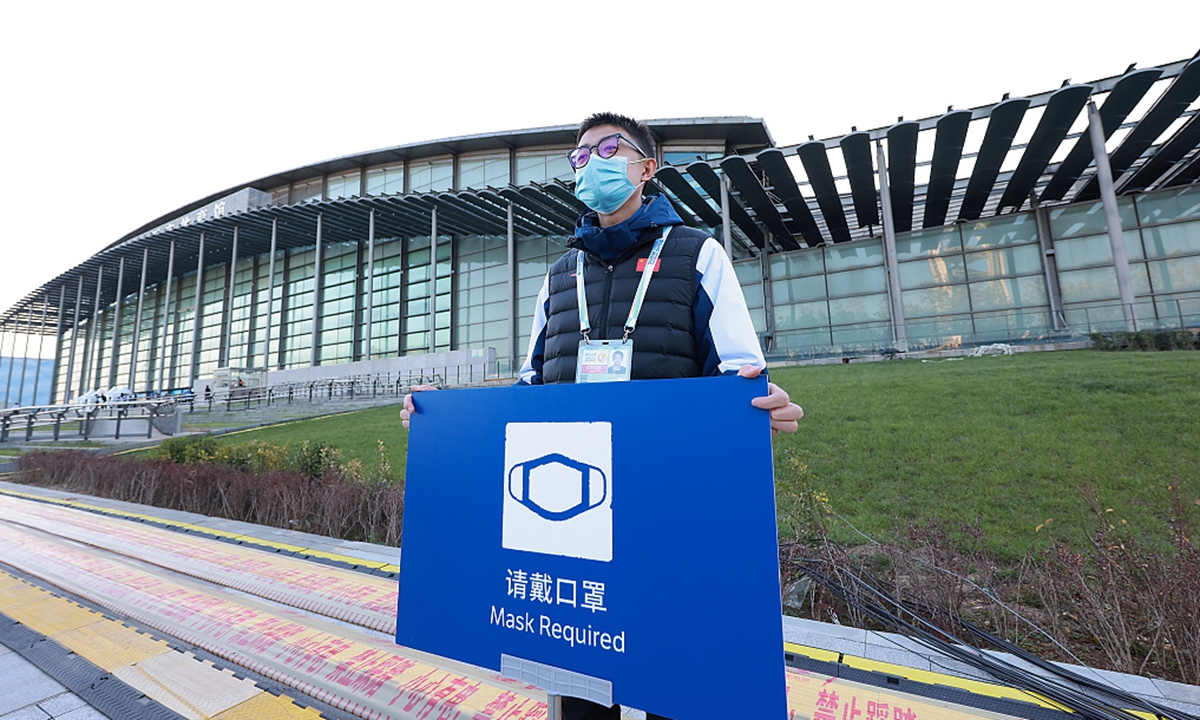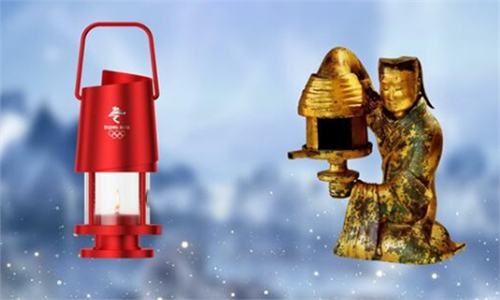Positive cases 'possible' during Beijing Winter Olympics but large-scale outbreaks 'unlikely'

A volunteer wearing a protective mask holds up a sign during a ice hockey test event match, held in preparation of the upcoming Beijing 2022 Winter Olympic Games, at the National Indoor Stadium on November 12, 2021 in Beijing, China. Photo: VCG
The Beijing organizing committee for the 2022 Winter Olympic Games said Thursday that a "certain number" of positive COVID-19 cases will be highly possible during the Games, as a large number of people from different countries and regions will come to China. But Chinese medical experts said it is "unlikely" there will be large-scale outbreaks during the Games under the closed-loop management system, and other effective and strict anti-epidemic measures.As the Games will be held amid the COVID-19 pandemic, especially the spread of mutant strains such as Omicron, which has brought great uncertainty to the global situation, positive cases or small clusters of local outbreaks are possible, Huang Chun, a deputy director of the epidemic prevention and control office of the Beijing Organizing Committee for the 2022 Olympic and Paralympic Games, said at a press conference.
The organizing committee has drawn up measures to handle positive cases, said Huang. Unlike city-level prevention and control procedures, not all positive cases from the Games will be sent to designated hospitals for quarantine and treatment. Instead, different arrangements will be made to distinguish whether the cases are symptomatic or not, Huang noted.
Asymptomatic cases will be sent to special quarantine facilities, which the organizing committee has set up in all three Games areas. Those who have shown symptoms will be sent to designated hospitals, namely Beijing Ditan Hospital and Zhangjiakou First People's Hospital, according to the press conference.
Asymptomatic patients are required to take nucleic acid testing every 24 hours after entering the quarantine facility. If they test negative two consecutive times, 24 hours apart, they can be released from quarantine. Based on their physical conditions and wishes as well as the needs of the event, they can return to the Games.
As the Games will be held under closed-loop management, close contacts of positive cases will not require centralized isolation for 21 days. Instead, they will be asked to live separately, have separate food delivery, and take special vehicles to and from the venue. Also, they should take nucleic acid testing twice a day, and if both tests are negative, they can return to the Games.
Minimizing the spread of infection from within the closed loop to the city is the bottom line of the prevention and control work, said officials at the press conference. All arrivals should follow the closed-loop management policy, and they can use special buses to travel to and from their sites, venues and workplaces. But they are banned from crossing the closed-loop.
Han Zirong, a vice president and secretary general of the Beijing organizing committee, said at the press conference that all personnel involved in the Games need to complete full vaccination at least 14 days before coming to China, so that they can be exempted from centralized quarantine and enter closed-loop management.
Han particularly recommend that Games-related people receive booster shots against COVID-19.
All organizations coming to Beijing for the Games are required to designate COVID-19 liaison officers who are responsible to ensure that members understand the anti-epidemic measures, assist them in making preparations before coming to China, and carry out communication and coordination work such as epidemic emergency response.
People involved in the Games should take nucleic testing every day, minimize social activities, wear masks, and avoid going to closed spaces and gatherings.
Cheering for the athletes is encouraged while singing and shouting are not recommended during the Games, said Han.
Moreover, Han said the event organizers will not sell tickets to overseas audiences in order to prevent the possible spread of COVID-19 and ensure the safety of all participants.
As the pandemic with the contagious variants known as Omicron and Delta are rampant in the world, China is unlikely to remain unaffected, Wang Guangfa, a respiratory expert at Peking University First Hospital, told the Global Times on Thursday.
With the increasing gatherings for the Games in winter, the emergence of sporadic cases is possible and in line with the nature of the disease, Wang said, noting that large-scale outbreaks are unlikely.
Calming the public, Wang expressed confidence in controlling any spread of COVID-19, saying that "China has developed a mature anti-epidemic mechanism that has worked well for Delta and Omicron, I believe it will work well during the Games."
"No need to panic about the possible positive cases," Wang noted.



